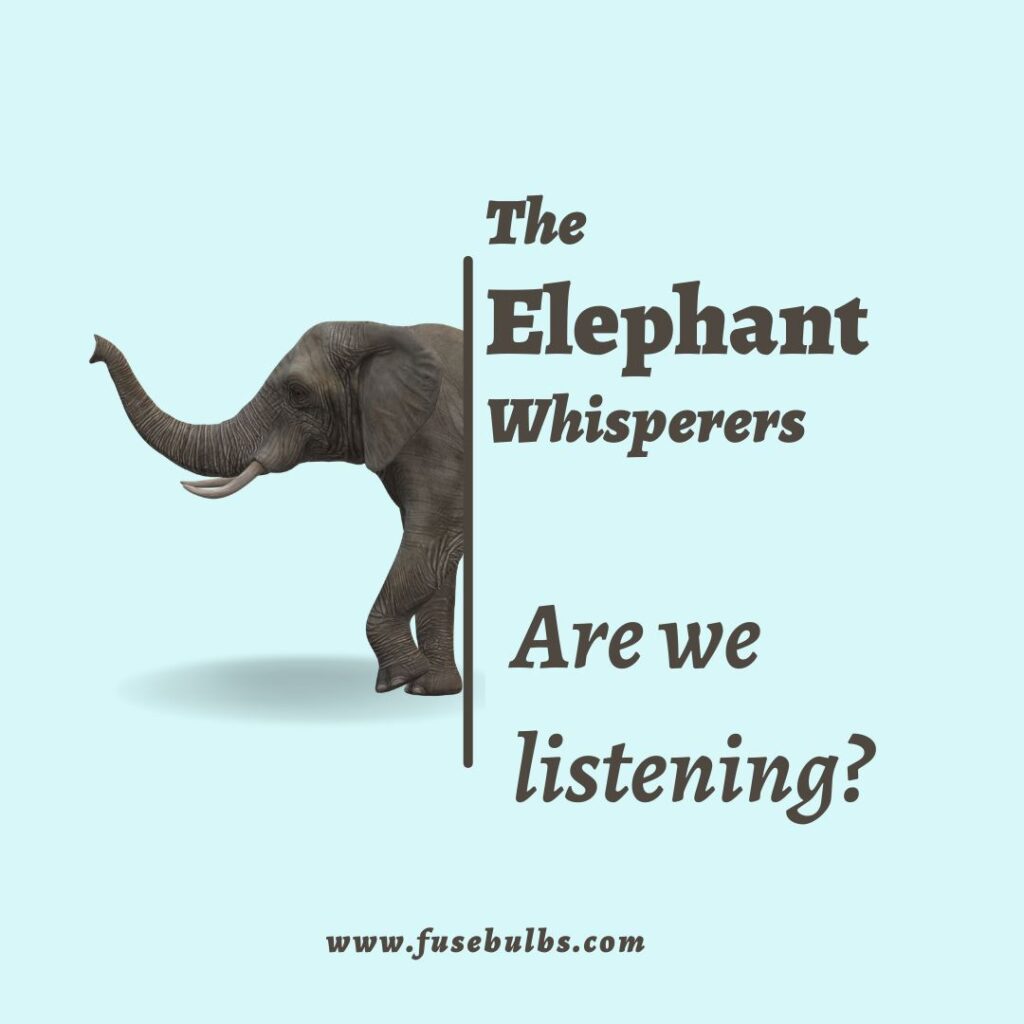The elephant whisperers !! Are we listening?
Dolly theater in Los Angeles experienced a prestigious and exhilarating night on 12th March 2023. In the prestigious 95th Academy Awards ceremony, held by the Academy of Motion Picture Arts and Sciences. A multitude of Oscar awards was presented to the most honored films released in 2022. Amidst all the films that made it to the top and a night to remember. The Elephant whisperers became the first Indian film to get nominated. It won the Oscars in the category of best documentary short subject film.
The Movie
Directed by Kartiki Gonsalves and produced by Guneet Monga. This movie beautifully captures the essence of exotic wildlife. It portrays an honest and pure connection between a loving couple and an orphaned baby elephant. Set against the background life of Bomman and Bellie living in the warm and calming mother nature in Tamil Nadu. It depicts their intimate relationship and how they devoted their lives to caring for and protecting and preserving the elephants.
Far from notorious activities and reckless lifestyles, this short film will inspire animal lovers, adventurous souls, and all those people for whom the well-being of the forest matters. With stunning visuals of Tamil Nadu’s great natural beauty, the movie explores the unforgettable journey of the elephants Raghu and Ammu and highlights the diversity of Indian culture.
It has a great cinematic experience and a joyful screen presence. the Elephant Whisperers is a heartwarming and exciting film that showcases the memoir of the couple’s experiences with these huge yet sympathetic creatures. It teaches us about loyalty and benevolence.
Oscar-nominated film ‘ The Elephant Whisperers ’ is a high-octane and cute love story that revolves around the soulful journey of an orphaned elephant. In a time when relationships don’t last forever, this documentary short film depicts a sacred bond between two human caretakers and an orphaned/abandoned elephant in Tamil Nadu and conveys a message of elephant conservation and protecting nature.
You can never match or forget an elephant’s sacrifices!
The majestic Elephant is the largest land mammal to roam our forests. All across Asia and Africa, this benevolent beast has been tamed to work for its human friends and provide them luxury and company whenever and wherever required. This man-animal coexistence has proven to be most beneficial to both parties involved but at times the elephants do not get their fair share of deserved appreciation and care worthy of such a magnificent species. The elephants engaged in the tourism sector and the ivory trade are overburdened and mistreated for the avarice of stakeholders. Hence, you can never even match or forget an elephant’s sacrifices!
The pachyderm is an essential part of forest ecology. But unfortunately, we are witnessing considerable dispersion or dislocation of elephant herds in large numbers owing to –
Loss of habitat due to the reduction in the original area occupied by forests and savannas.
1. Degradation of the quality of elephants’ habitat.
2. Increase in the human population.
3. Building of infrastructure necessary for modern civilization.
4. Human – Elephant conflict in the utilization of vegetation and natural crops
5. Last but not least, poaching for ivory tusks.
The elephant species is in danger: Some astonishing facts
A common occurrence throughout Africa and Asia, elephant populations are witnessing a steady decline. As per reports, elephant numbers have gone down by 62% over the last decade. Some estimates say that elephants are on the path to extinction and could get exterminated by the end of the next decade if we do not take immediate steps to protect these elephants. If the status of Asian elephants gets seriously threatened we will not be able to see a future for other species as well who interact with elephants either directly or indirectly and co-exist in their habitat.
Due to the demand for ivory, African elephants are a highly vulnerable animal species to poaching for their tusks. On average, poachers seeking ivory and meat brutally kill 100 African elephants each day leaving only 400,000 remaining elephants. If we look at yearly data, each year, at least 20,000 African elephants are slaughtered for their tusks.
Due to poaching for ivory which is considered a symbol of wealth and prestige in Asia, even the planet’s smallest and most innocent elephants are killed for their precious tusks and illegal ivory trade. According to some Unofficial estimates, illegal trade in ivory is worth around US $18 billion.
Ivory trade is an illegal and rampant practice, particularly in parts of Asia. In the quest for profits and revenues, tens of thousands of elephants have been slaughtered and subjected to wildlife crime.
International elephant conservation is the need of the hour
Since time immemorial, tuskers have been the grand old counsels of the forest. They are the keystone species without which the delicate balance of a healthy forest ecology can rapidly crumble. The existence of matriarchal elephant herds has always benefitted all other species existing within a forest system. Let us enlist why the conservation of elephants is essential in a few pointers –
- Herds create pathways that help other species to traverse dense forests easily.
- Elephant dung helps the growth of algae and fungi which are the preferred diet for a number of insects and reptiles.
- Dung beetles are the diet of choice of many insectivorous birds.
- Elephant dung deposits in water holes enrich food sources for fish and amphibians.
- Elephants ingest and pass seeds through their alimentary canal and thus help maintain a diverse plant variety to maintain a heterogenous forest.
With a reduction in the number of wild elephants across Asia and Africa, the basic forest ecology is under threat. The dwindling numbers of elephant herds are also indicative of the eventual extinction of many other smaller species of wild animals. The most vivid example is that of the savanna deer which almost disappeared from Africa as Lions had favorable hiding space in the overgrown bush in the absence of elephant herds grazing in that area.
When elephants were brought back, the deer population also flourished, the scarcity of which was causing lions to starve to death.
Efforts are underway across continents to conserve elephant habitat and resolve the problem of fast decreasing elephant population. Let’s talk about some prominent conservation programs in the following paragraphs.
Elephant conservation programs and efforts
- The International Elephant Foundation in Africa is working on multiple fronts to resolve man-animal conflict and protect elephant habitats. It aids institutions, organizations, and individuals to engage in the conservation process through education and research, as also elephant husbandry. Apart from propagating anti-poaching practices, they train people to treat and prevent diseases in elephants. IEF also funds and produces publications for the improved management and welfare of elephants in human care.
- The WWF has been actively trying to reduce the demand for ivory and stop the illegal ivory trade. Their anti-poaching efforts are spread across countries and most recently they have trained forest rangers in Cambodia and Vietnam to assess elephant habitat and stop any attempts at poaching.
- The WCS (Wildlife Conservation Society) has been instrumental in elephant conservation in 9 countries in Asia and 12 in Africa. Their most recent victory has been in Thailand where passive fencing techniques were successfully implemented to guide elephants away from agricultural fields adjacent to the country’s largest national park. This helped resolve the man-animal conflict while ensuring safe habitat for the elephants.
Let us fight against elephant poaching and end the elephant ivory trade
Behind every piece of ivory, there is an elephant so majestic and alive, so spectacular and willing to survive. This rampant poaching epidemic which is killing elephants for their tusks needs to stop!
Although some countries like China, the world’s biggest ivory market, already announced in 2016 that all ivory sales within the country would be banned, other major ivory markets are linked to illegal trade and there is still a long way to go. The government must seriously think about the implementation of the ivory act and banning commercial trade in ivory.
We as responsible citizens and animal lovers must place pressure on the government to close down and shut down all the shops symbolic of the global ivory trade and ensure this happens swiftly so that no more innocent elephants have to bear the brunt of the illegal ivory trade. And alongside, we should also work to change consumer behavior to reduce the demand for wildlife products such as ivory which is the predominant reason for the poaching of elephants.
As both the international community and countries worldwide continue to tackle the challenge of elephant poaching, we as citizens and animal lovers should also undertake some responsibility to ensure our elephant friends’ safety by abandoning the use of tusks which threatens the animal’s survival.
Also Read:-Where are the sparrows
If you love reading our stories please Follow us on Instagram


